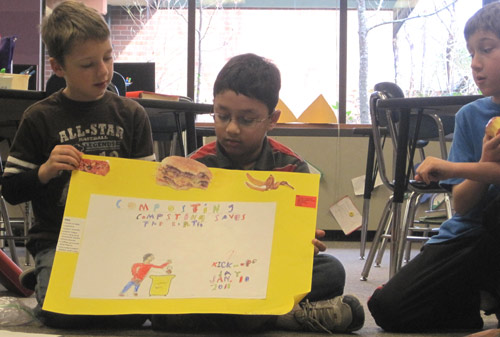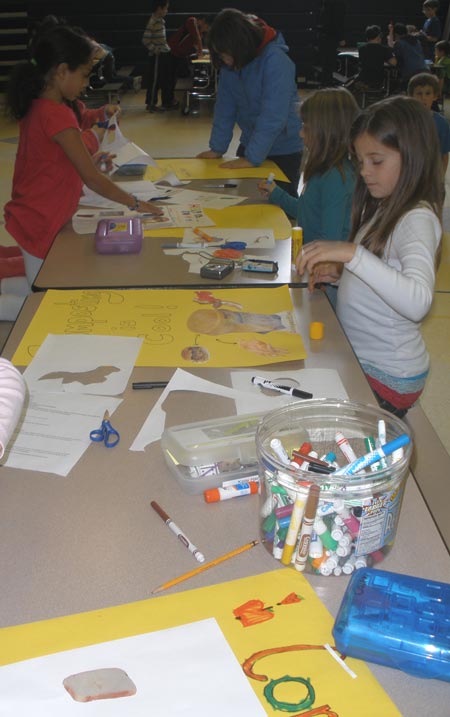Success story: Apollo Elementary School
School District: Issaquah
School Location: Renton
Began participating in the Green Schools Program: September 2010
Level One of the Green Schools Program: Achieved in May 2011
Level Two of the Green Schools Program: Achieved
in May 2013
Level Three of the Green Schools Program: Achieved in May 2015
2015-2016 Sustaining Green Schools: Achieved
in May 2016
Sustaining green school – 2015-16
- Apollo Elementary School sustained its Level One waste reduction and recycling practices, Level Two energy conservation practices, and Level Three water conservation strategies.
- The school increased waste-free Wednesday lunches from a one-time event in the spring 2015 to once each month in the 2015-16 school year. Waste-free Wednesday reminders and tips were promoted during lunches, in announcements and e-newsletters, and in-person at the school’s science night.
- The Green Team hosted a waste reduction and recycling booth at the school’s Earth Day science night. Green Team students facilitated a trash, recycling, and compostable materials sorting game and participants earned a Rocket Slip (Apollo Elementary award) or an Earth globe key chain as a prize. The students spoke with many adults about how to pack a waste free lunch and distributed flyers with information regarding their school goals.
- Green Team activities and successes throughout the school year were shared electronically with the parent community and on the school website.
Waste reduction and recycling (level one)
- Apollo Elementary maintained a recycling rate of 51 percent thanks to a school-wide program that included classroom, office, staffroom and lunchroom recycling and food scrap collection.
- With assistance from the City of Issaquah, Apollo launched a compostable materials collection program in 2010. Compostable materials collected from the lunchroom, staff room and classrooms were delivered to Cedar Grove’s composting facility.
- Fourth-graders were trained on proper food scrap sorting and monitored the lunchroom food scrap, recycling and garbage stations for three weeks to ensure proper sorting of materials.
- The fourth-grade student Green Team provided school-wide education and promotion for recycling and food scrap collection. Outreach included presentations and quizzes in every classroom, as well as collaboration with the first-grade Green Team on making posters and signs. Additionally, students placed stickers that list what can and can’t be recycled on all recycling containers throughout the school.
- Apollo’s staff Green Team made a recycling and composting presentation to all teachers at a staff meeting.
- In addition to regular school-wide recycling, one class held a week-long aluminum can drive and donated proceeds to earthquake relief efforts in Japan.
- School administration encouraged staff to reduce paper use by making double sided copies, using email for communication, and sending newsletters and parent information electronically.
- A reuse box for “Good On One Side” paper was placed in the staff workroom, and construction paper scraps were used for scratch paper, notes and art projects.
- To encourage reuse, Apollo held a book swap in conjunction with its annual Spring Fling.
- Along with all schools in Issaquah, Apollo replaced plastic wrapped utensils with unwrapped utensils and eliminated the use of straws.
- In 2012-13 Apollo participated in the Zero Waste Challenge. The school placed within the top three finalists.
- Students promoted the Zero Waste Challenge by presenting at lunch and in staff meetings. The school also placed reminders in the electronic newsletter, made announcements and created educational posters.


Energy conservation (level two)
- The student Green Team posted signs near light and electrical equipment to remind staff and students to turn them off when not in use.
- Information was sent to staff and parents about the school’s energy use via the Apollo Orbiter, a monthly e-newsletter .
- A local environmental engineer visited the fourth-grade classroom to discuss the energy practices at his work site and how energy conservation is connected to the science curriculum.
- To conserve energy, teachers shut off some of the overhead lights when natural light is sufficient.
- The Issaquah School District’s contract with its drink machine vendor included a requirement that the lights on the machine’s display would be permanently turned off.
- The school technician sent periodic reminders to staff to use energy efficient modes for smart boards and projectors.
- Staff was reminded via email to keep windows and doors closed when heating and cooling is on.
Water conservation and pollution prevention (level three)
- Green Team students regularly shared water conservation facts and tips in school announcements.
- During Green Week, teachers shared conservation information with their classes, and students were asked to sign conservation pledges.
- Teachers sent home requests for students to only bring reusable water bottles to school.
- The Green Team watched the “Story of Bottled Water” video.
- The school shared its water use rates in school announcements, teacher newsletters and emails to parents.
- Kitchen staff refrained from pouring fats, oils or grease down school drains. A sign with the same reminder was also posted in the staff room.
- Water conservation signs were laminated and posted by each school sink.
- The majority of faucets in the school were set to turn off automatically when not in use.
- The school installed low-flow toilets, low-flow sink aerators and dual flush toilets when possible to conserve water.
- Apollo eliminated irrigation lines to reduce summer water use.
Awards
- Apollo Elementary School won the Waste Free Lunch Challenge sponsored by City of Issaquah and Issaquah School District. Apollo’s 601 students generated two pounds of waste - only 0.054 ounces per student - during one lunch period.
For more information about the school’s conservation achievements and participation in the Green Schools Program, contact:
Andrea Wolfe, teacher
WolfeA@issaquah.wednet.edu
Dawn Wallace, director of instructional support, Teaching and Learning Services, Issaquah School District
WallaceD@issaquah.wednet.edu
Chris Bruno, resource conservation manager, Issaquah School District
BrunoC@issaquah.wednet.edu


 Translate
Translate
